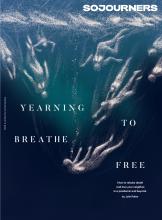FIONA APPLE’S 2020 internet takeover began the moment she released her newest album, Fetch the Bolt Cutters, in April. This cyber movement was not orchestrated by Apple, who does not have any social media accounts, but rather by the countless women tweeting, Instagramming, and exulting over the album. I probably have the algorithm to thank for the prevalence of these posts in my feed, as they were mostly from my demographic—millennial women with overflowing collections of books and high-waisted pants. Yet, algorithm or no, the joy I witnessed was completely organic, and if you’ve heard the album, you’ll understand why.
Many people’s introduction to Fiona Apple is not her strong, eclectic body of work. Instead, it’s her infamous speech at the 1997 MTV Video Music Awards in which she exhorts viewers, especially adolescents, not to model their lives after “what we think is cool.” After that, Apple seemed to vanish from the public eye, emerging every so often with an absurdly long album title that tied bundles of complicated songs together.
I’m beating around the bush with the word “complicated.” What I really mean is “angry.” Fiona Apple is one of the few women in music who is allowed to be furious in an unpretty way. She has become a secular patron saint for prophetic women whose insight makes them vulnerable to the ridicule of others.
Read the Full Article

